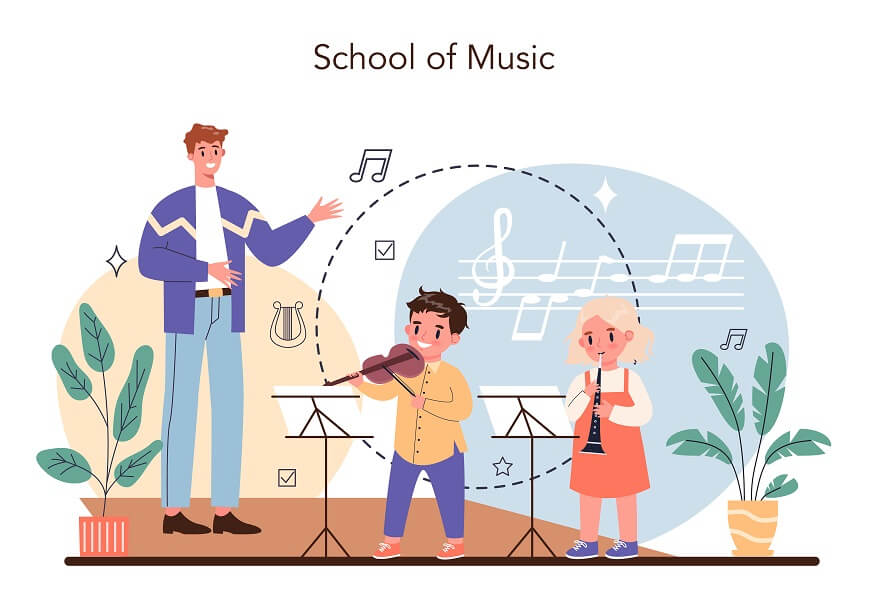Irrespective of cultural and geographical boundaries, music is that universal language that binds human beings together, adds to the richness of life, sparks joy and touches the hearts of people of all ages. For children, music plays a significant role in nurturing and fostering various aspects of their life beyond just providing entertainment. Incorporating music into education is an influential tool in facilitating a child’s overall development.
The importance of music education extends beyond learning to sing or play an instrument. Music education aims to cultivate talent, encourage self-expression and promote self-growth. It incorporates the development of several areas critical to a child’s development. These areas include cognitive, behavioural, social, emotional and physical development.
In this blog, we will delve into the many benefits of music education for children and explore how it contributes to their growth and well-being.
Cognitive development
According to neuroscientists, the processing of music involves the same areas of the brain associated with cognitive functions like language, auditory perception, attention, memory, and executive functions like planning and organisation.
One study conducted by Stanford University found that children who received music lessons over 20 months demonstrated an improved ability to focus attention and improved IQ over their counterparts who did not receive any music training. This substantiates the point that music can indeed play a significant role in enhancing cognitive development.
Music education has also been found to positively influence memory among children. Music at its core requires pattern recognition and memorization, both of which stimulate and strengthen the neural pathways linked to memory in the brain.
Music education has also been seen to aid in improving children’s concentration, enhancing their attention spans and helping them perform better in academic tasks. Such development aids them in other subjects such as mathematics and languages. Music promotes brain plasticity and enhances brain functions like auditory processing, motor control, and perception. These cognitive benefits are especially significant during childhood, a crucial period for brain development.
Emotional development
Music education in children, particularly in their formative years, can shape their emotional literacy by helping them detect and understand emotions. For instance, various pieces of music reflect different sets of emotions- happiness, excitement, sadness, or fear. Children’s ability to distinguish these emotions within musical compositions improves their emotional intelligence.
Integration of music education can also help cultivate empathy and compassion in children, as they begin to understand emotional responses. Exposing a child to music raises their self-awareness and promotes a higher level of emotional understanding.
Music can influence the way children perceive and respond to the emotions of others without the requirement of verbal articulation. They can project their emotions through singing, playing a musical instrument, or even just listening to music. This form of emotional expression can be particularly beneficial for those children who find it challenging to express their feelings verbally.
Participating in music ensembles, choirs, or bands encourages children to collaborate with their peers, teaching them valuable social skills such as teamwork, cooperation and respect for diverse perspectives.
Physical development
According to a study published by the American Psychological Association, the incorporation of music practices in a regular curriculum can significantly enhance the development of fine motor skills (Forgeard, Winner, Norton & Schlaug, 2008). Playing an instrument, for example, involves coordinating breathing, finger movement, and arm movement, thus enhancing children’s physical dexterity and hand-eye coordination.
Children involved in rhythmic activities or dance, associated with music, demonstrate considerable improvement in their overall body coordination and spatial awareness. Consequently, incorporating music and movement into the curriculum can support children’s capacity to master complex physical tasks.
Besides these, music in education is also beneficial in enhancing children’s physical stamina. Playing an instrument or participating in dances or performances necessitates sustained energy and breath control, gradually enhancing endurance. For instance, children playing wind instruments such as flutes or trumpets have shown significant improvement in their respiratory control.
Active incorporation of music in student’s lives enhances the children’s overall physical health, reduces stress, increases productivity, and fosters a lifelong appreciation for fitness and well-being.
Behavioural development
Music education can also positively influence a child’s behaviour. Music offers children an outlet for self-expression. Learning to play an instrument requires discipline, patience, and dedication, attributes essential for behavioural development. Studies have also shown that music education can reduce anxiety and promote attentiveness and self-esteem. As children gain proficiency in music, it boosts their self-confidence and sense of achievement.
Through music, children discover their unique talents and abilities, their strengths, interest and passion, opening routes for self-discovery and personal growth.
Music provides a coping mechanism to children which helps them release their stress and anxiety. Engaging in music serves as a powerful mechanism for them to deal with various kinds of trauma, emotional imbalances, escapism and diverse learning challenges.
Music in education plays a crucial role in helping students pick music as a career. There are famous musicians, singers, music composers, and producers around us to draw inspiration from who picked up their music skills early in life and progressed into becoming masters at it.
Cultivates cultural and historical awareness
Music education exposes children to a wide variety of music genres from cultures across the world. Through the study of the history and evolution of music over time across different cultures, they learn about the historical events and societal changes that helped musical traditions evolve. This fosters a sense of cultural identity and heritage among children.
Conclusion
Music education is a vital component of comprehensive child development. The numerous benefits underline the importance of music as an essential subject in the educational curriculum. Hence, music education should no longer be seen as a supplemental or extra-curricular activity, but as a critical element in the educational system. The integration of music in education not only cultivates musical talents but moulds a well-rounded individual capable of succeeding in different areas of life.
At EuroSchool, we believe an education curriculum must cater to the child’s holistic development. As a promising avenue for children’s well-rounded development, we promote music as a part of education to enhance their personality and provide them with a well-rounded educational experience.










